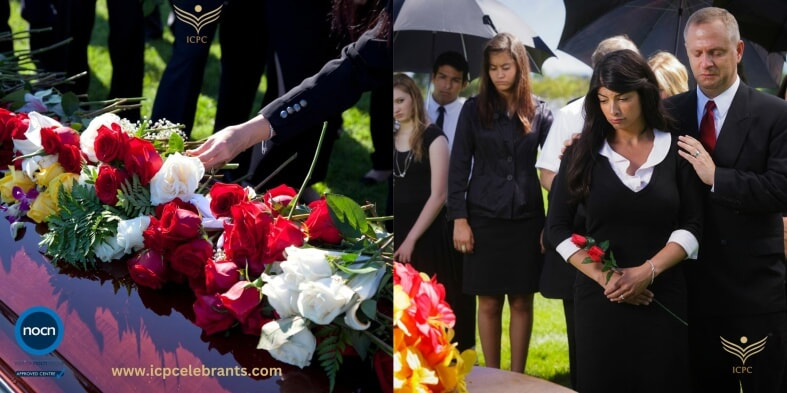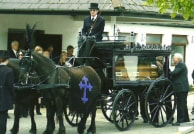Funeral Service Plan: Basic Cremation ServiceDuring a funeral service, each element should be tailored to honour the life of the deceased and provide comfort to their loved ones. If you prefer a simple and straightforward cremation service without a eulogy or tribute, the following outline presents the basic components to consider: Reception and Gathering: Provide a designated area where family and friends can gather before the service begins. This allows them to express condolences, share memories, and support one another in their grief. Introduction and Welcome: Begin the service with a brief introduction by the officiant or a designated person, expressing gratitude for everyone's presence and acknowledging the purpose of the gathering. Music Selection: Choose instrumental music, soothing melodies, or ambient sounds that create a peaceful and reflective atmosphere. This can be played softly in the background throughout the service. Moment of Silence and Reflection: Invite attendees to observe a moment of silence to honour and remember the life of the deceased. Encourage them to reflect on their personal memories and offer their own private prayers or thoughts. Reading of Poems or Passages: Select meaningful poems, scriptures, or literary passages that resonate with the life and beliefs of the deceased. These readings can be performed by a close friend, family member, or the officiant. Commemorative Slideshow or Display: Prepare a slideshow or display of photographs that depict significant moments and cherished memories of the deceased. Showcase their life journey, family, friends, and milestones to evoke a sense of remembrance and celebration. Observing the Act of Cremation: If desired, arrange for attendees to witness the act of cremation, following any legal and practical considerations. This can provide closure for family members and a final opportunity to say goodbye in a private and intimate setting. Closing Words and Thank You: Conclude the service with closing remarks, expressing appreciation for everyone's attendance and support. Offer gratitude to those who have assisted in organising the service and extend an invitation to join for any post-funeral gathering or reception, if applicable. Disposition of Ashes: Discuss the preferred plans for the disposition of the ashes, whether it's scattering them in a meaningful location, keeping them in an urn, or other chosen methods. Provide instructions or resources for any necessary legal procedures. Support and Aftercare: Ensure that grieving family members and friends are aware of available support services, such as grief counselling, support groups, or bereavement resources. Share contact information for local organisations or professionals who can assist them during this difficult time. Remember, even in a basic cremation service, it is essential to honour the life and memory of the deceased while offering support and solace to those left behind. Tailor the service to reflect their individuality, beliefs, and the wishes of the family, creating a meaningful and respectful experience for all attendees. Download the Basic Funeral Service Plan:
If you have been bereaved by the suicide of a relative or close friend, you might want to contact us.
We are a national Charity providing a confidential telephone helpline, support information and group meetings. For more information contact +44(0)1495247258 or visit www.uk-sobs.org.uk When We Lose Someone
When we lose someone close to us, be it a family member, a friend, or even a beloved pet, we have to deal with that loss. Grief is the term used to describe this emotional response of deep loss, sorrow, and ache. While grief is generally associated with losing a person, you may also feel grief at losing a treasured item, a job, or your marriage. Grief is generally a very intense feeling of loss, but not all losses cause the same level of grief. Bereavement, or the loss of a loved one, is often much more painful than the sorrow associated with losing a job. Grieving: We All Experience Things Differently When you are grieving for some one or some thing, you may experience a wide and varied array of emotions and thoughts. In fact, no two people really grieve the same way, even if they are grieving over the same thing. There is no defined way of grieving, and there is no such thing as unnatural or abnormal grieving. Likewise, there’s no set timeline for grief—some people may move on earlier than others. While it is true that everyone grieves in their own way, there are some common things that almost everyone does. Most people feel sad. If the loss is sudden, shock and numbness are usually experienced. Some people lash out in anger, while others feel guilty that they couldn’t prevent the loss. Some sink into depression and don’t want to leave their home; others throw themselves into work and their social lives to forget about the loss. Often, grieving affects more than just your mental state. Grief can also cause you to lose your appetite or cause sleeplessness. Grief may even make you physically ill, especially if you aren’t eating well or sleeping regularly. Pre-Loss Grief While most feelings of grief come after the loss, it is possible to experience pre-loss grief. If a loved one is dealing with a terminal illness, for example, you may start to mourn their loss long before they actually pass away. You may also feel the loss of your marriage months or even years before signing divorce papers. This type of grief is, like all grief, perfectly normal. Just because you’re experiencing it before you lose something does not mean it should not be taken seriously. However, even though some people get over loss quickly, it’s important to note that grieving is a process that should not be avoided? If you have lost some one or some thing, you need to take the time to mourn it properly. If you don’t deal with your not, it will only build up inside you until it breaks out. How to you deal with grief? Some people handle their emotions on their own, and that is perfectly fine as long as they do so in a healthy way. However, some people find that they can’t handle the loss themselves. Loss, especially a huge loss, can be terribly painful. There’s nothing wrong with asking friends and family for support or even going to a grief counsellor. There are some negative ways of dealing with grief, though, so be certain to know what is a healthy reaction and what is not. The Five Stages of Grief
While everyone grieves in their own way, many therapists and other health care professionals have recognized that most people go through a set of common stages of grief. These five stages, set out by Elisabeth Kubler-Ross in her book On Death and Dying, provide grief counsellors with a set of common guidelines to help those who are dealing with loss. Stage One – Denial When something traumatic happens to someone, one of the first natural responses that they will feel is denial. People who find themselves thrust into a situation where they have to deal with grief or with someone who is experiencing grief will notice that one of the first things that can happen is that the person who is attempting to cope with the grief and loss will feel a strong sense of denial. He or she will often not believe that the loss is happened to them so that they do not have to deal with it. People who are going through denial may start to say things like, “This all has to be a dream,” or “This isn’t happening to me.” These are normal responses to a tragedy as many times when we are dealing with death and loss it can be too much to handle at once. The person who is grieving wants to believe that these events are not happening to them and that everything is going to stay the way that it was. Many times the stage of denial is one that hits adults harder than children because children are better adept at dealing with change and coping with powerful circumstances. Dealing with Denial One of the strategies of denial that many people use is to consider their situation to be one similar to a television show or a movie where there is always a plot twist at the end— there’s always that revelation that someone who was thought to be dead is suddenly and miraculously alive. They are waiting for that moment when the police or the doctors tell them that there has been a horrible mix up and that their loved one is not actually the person who died. To them, the story is not complete, and they feel like they have been left with part of a cliff hanger in which they must only wait for the revelation which tells them that there really isn’t any loss for them to deal with. To those who have not experienced this kind of grief it may appear that the stage of denial is a childish way to deal with the loss of a loved one. This is not the case. In fact, denial is an important coping mechanism that helps people deal with this kind of loss in a manner that will allow them slowly and gradually come to terms with the situation. The period of denial is generally a short-lived one, although different people will progress through denial at varying rates. Accordingly, there is no definite period for how long a person will remain in the stage of denial. Helping Someone in Denial If you are dealing with someone who is experiencing this stage of grief then the best thing that you can do is to gently remind them of the reality of the situation. Do not try to be too pushy and convince them that their loved one really did die as this can sometimes cause a stress reaction. In most cases, they will eventually come out of this stage of grief on their own; however, if you are dealing with someone who appears to remain in the denial stage of grief for an extended period of time, you might consider getting them into a type of grief recovery program with a therapist who can gradually pull them back to the situation at hand so they can continue to move through the remainder of the grieving process properly. Stage Two – Anger
Following the stage of denial is the stage of anger. Once people who have experienced an important loss get over the denial phase of grief and accept the situation, they are often confused about where they should focus their energy in order to deal with things. This can lead to confusion and that can turn into anger. These feelings of anger can be focused at anything from the person who has passed away to God, and many times the emotional irritation that people experience can range from true rage to frustration. You should not be surprised when people who are going through the anger stage lash out at the people around them. This can happen because they have nowhere else to focus these feelings, and those who are nearest to them will end up bearing the brunt of these emotions. Sometimes, you may even notice that someone who is going through anger will feel ashamed that they are mad, and this is because the real focus of their anger is on the deceased for leaving them. Since it feels wrong to blame the deceased for what has happened, people will then turn their anger to those who are still alive and who have not suffered this tragedy with them. Family members may even lash out at other family members for things they see as problems, such as not grieving “correctly” or enough. Dealing with Anger When someone is going through the anger stage of grief they will often have thoughts like “Why have you left me like this?” or “This cannot be happening to me, I’m a good person.” This kind of anger is often directed at the world for what is perceived as an unfair outcome. Sometimes it is closely linked in to the stage of denial as people realize that this is in fact happening to them. It feels as if the world has pulled the rug out from under them in some sort of colossal mishap. To many it seems as if something this bad can only happen to bad people, and since it happened to them, it has to be some kind of accident. If you are someone who is going through the anger phase, try and remember that you need to get through the stage without causing harm to relationships with family and friends. It is important that you remember not to focus all of your negative energy at others. They are not responsible for your tragedy, and although you may find yourself getting frustrated with everyone around you and with their actions, you need to remember that they are only trying to help you through this situation. Take a few moments each day to sit by yourself and try to harness your anger so that you don’t have any unnecessary outbursts. Remember to always apologize if you do take your anger out on someone else. Helping Someone with Anger If you are dealing with someone who is experiencing loss and lashing out at people in anger, remember that they are not targeting you specifically. It is never a good idea to react to their anger with anger. Instead, try to diffuse the situation by being as agreeable as possible. Eventually, the person will likely go ahead and realize that they are treating you badly because they are mad at the situation; however, if you get mad and argue with them, you will be participating in the anger, and this could trigger a tense situation that will take longer for them to recover from. One’s patience can be tried when they are around someone who is always angry and distraught with grief. You have to remember to keep in mind that you are dealing with someone who is trying to adjust to a major change in their life. Stage Three – Bargaining
The third and middle stage of grief that a person works through after experiencing a significant loss is bargaining. This period is difficult for most people as they have already gone through the immediate reactions of denial and anger but are still unable to accept what has happened. The stage of bargaining usually involves a series of promises that a grieving person will make that involves exchanging something to get their life back to normal. Sometimes, people engage in bargaining not for a return to normalcy but rather as a means to make the pain that they are experiencing come to an end. The process of bargaining is an important one that allows people to work through their grief in a series of realizations that usually occur through their promises. Sometimes people will bargain with God, but if they are not religious, they may instead focus the bargaining on an interior level. Some things that people who are in the bargaining phase of grief may say include “I’ll do anything if I can just talk to them one more time” or “I’ll give up drinking if they will come back.” These deals are a person’s way of trying to regain control in their lives. Dealing with Bargaining If you are experiencing this stage of grief, you will find yourself making these promises at various times. It is important for you to know that it is okay to make these bargains. You should not feel guilty about wanting to be able to regain control. Loss of control can completely disorient some people, and by making bargains that you can make happen, you feel like you are regaining some sort of hold on your life. In fact, bargaining can be an important process as you may find yourself using it as a tool to help you get through difficult parts of the day. Those who are dealing with people in the bargaining part of the grieving process will probably not notice too many changes. This is because the bulk of the negotiating will happen on an interior level, and you are unlikely to hear many of these deals. However, if you do overhear any of these bargains then you should do your best to let them go by the wayside. This process of making deals is the grieving individuals’ way of coping with their loss, and it is often a very private affair. They are trying to find a way to deal with this new world that they have found themselves in, and by offering these trades and bargains, they are doing their best to regain some form of control in their lives. If you get involved and try to persuade them to stop bargaining then you are taking away part of their control, and they may lash out at you. Helping Someone in the Bargaining Stage One reason that bargaining is such an important step for the person going through the grieving process is that it is a transition point between the intense stages of anger and depression. This step is something of a cooling off point between these two extremes in which the person can try and focus their energy at something that makes them feel as if they still have a little control in their lives. Stage Four – Depression
Depression is one of the most worrisome stages of grief. While it is classified as the fourth stage, it can in fact occur at any point in time. This is what makes depression such a problem. The stage is generally classified between bargaining and acceptance because that is the point when people are more vulnerable to this mentally draining process. After one goes through the bargaining stage they realize that they cannot truly change anything and that their loved one is gone. This knowledge brings with it the honest truth of the situation they are now in, and they will have to face the hardships of day to day life knowing that the person they loved is not coming back. The following are some of the signs that someone is going through depression: ~ Increase in sleeping patterns ~ Rapid changes in moods ~ Irrational behaviour ~ Unwillingness to leave the house Dealing with Depression If you are experiencing any of these symptoms of depression then you should realize that these are a normal part of the grief process. However, while depression is an important step to dealing with your situation, you do not want to give into these temptations to crawl into bed and ignore everything. As hard as it may be, even simple tasks like getting up, putting on your clothes, and going to the store to do some grocery shopping can signal an important return to normalcy. You should try to make sure that you do at least one thing each day that will get you out of the house, and if possible you might also want to go out with friends and family to eat or see a movie. Feelings of guilt may accompany these outings, and that’s also normal. It’s normal to feel guilty that you are doing things you enjoy while someone you love has passed away and can no longer do these things. The combination of depression and guilt can be a strong one, and different people will handle this differently. It’s important to note that there is no set time period for how long it takes to deal with the depression. However, if you find that you cannot throw off the depression on your own, you may want to seek the help of a therapist. This is not something to be ashamed of as many people find that they need help getting over depression. Helping Someone with Depression Those people who are around those who have lost someone that they are close to may notice some of the signs of depression. If you do, you will need to walk a fine line. On one hand, the person needs to go through this stage and grieve but on the other you do not want them to sink into a deeper depression. You should remain vigilant and notice if there is any increase in the intensity of the depression. In order to alleviate some of these symptoms, you may want to try and get the person who is depressed out of the house on some normal errands. If this does not help to break up the cycle, then you may want to suggest that the grieving person attend some form of group therapy or see a grief counsellor who can help them through this difficult time. It is important to remember that this is a situation that should be handled with extreme care. Stress to the person that you are concerned about them and that you are there for them. Stage Five – Acceptance
The road through the grieving process can be a long and tiresome one when you are trying to cope with the loss of a loved one. However, after a while you will come to the stage that is known as acceptance. There is no time frame for how long it will take to get to this point as it varies from person to person. Years may pass before you come to the acceptance period, and you may feel that it is something you may never be able to reach, but you should not lose hope. Acceptance is the point in the process when you accept that death is a natural part of life and that it is something that must happen to everyone at some point. When people have lost someone after a long battle with an illness, this point may come more easily as they often go through the other stages of grief before the actual death occurs. However, if you are experiencing the sudden loss of someone, reaching the acceptance stage can be a lot more difficult because you were completely unprepared for the situation and thought your loved one would be around for quite some time. Dealing with Acceptance It is important to note that once you reach the acceptance stage, it does not mean that you will never again slide back into a depression. It’s not as if you wake up one day and suddenly realize that everything is okay and you can move on, and you should not be disappointed in yourself if you do not do this. Too many times people assume that one day everything is going to return to normal and that their lives are going to be put back together the way they were before the death occurred. In truth, you may never actually feel the same way as you did before the loss, and that is okay. Acceptance does not mean that life magically returns to normal; it just means that you can see the light at the end of the tunnel, and you might feel some relief from the heavy burden that grief causes. Mesothelioma.net has a wide variety of information about cancer patients coping with their diagnosis, as well as extensive therapeutic practices and habits that victims and families can get involved in to help with the grieving process. It is their goal to help better educate the public about the importance of recognising poor mental health within the cancer community and to lend our support.
For mesothelioma patient support and treatment information please visit https://mesothelioma.net/ |
View by Category
All
Bespoke FuneralsHandling the CostsTestimonials |
||||||
|
Celebrant Training Courses
|
Celebrant Services
|
Useful Links
|
Our NOCN Center Number is ICP Celebrants 30003224
©
The International Corporation of Professional Celebrants Limited. All Rights Reserved. Company No. 12693562 | Web Design by Line of Vision








